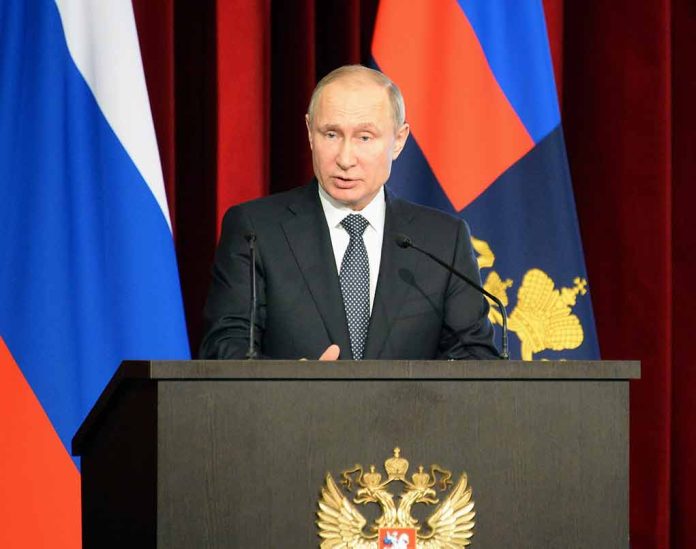
Russian President Vladimir Putin has openly called for Israel to withdraw its military forces from Syria, sparking debate on regional stability.
At a Glance
- Putin calls for Israel’s military exit from Syria to stabilize the region.
- Russia’s military withdrawal from Syria may cause a power vacuum.
- Debate over Israel’s intentions to leave Syria persists.
- Geopolitical tensions could escalate between regional and global powers.
Historical Context and Present Dynamics
Russian President Vladimir Putin has recently urged Israel to scale back its military presence in Syria, pointing to the destabilizing effects of Israeli activities. The appeal came during his year-end address, where he emphasized the importance of international diplomacy and reducing military interventions. Russia’s involvement in Syria dates back to 2015, when it intervened to support the Assad regime during the civil war.
Russian troops are currently seen departing from Syrian military bases, including the notable Khmeimim airbase. Satellite imagery and ground reports confirm these movements as Russia faces internal constraints. Putin’s appeals against Israeli expansions reflect Moscow’s concern about maintaining its influence and stability in the region amid shifting alliances and evolving conflicts.
Putin says Israel is main beneficiary of events in Syria, doubts IDF will withdraw troops https://t.co/m7VWznwziM
— ToI ALERTS (@TOIAlerts) December 19, 2024
Geopolitical Impacts of Military Withdrawals
The potential shift in the regional balance of power is a tale of intertwining strategies and uncertainties. Russia’s withdrawal possibly leaves room for Iranian and Hezbollah forces to seize greater control, thereby complicating matters for Israel and the U.S. The West, wary of these developments, may find itself at a crossroads, contemplating future military and diplomatic strategies.
Israel, arguing legitimate security concerns, has established a military presence in buffer zones following Assad’s fall. Yet, its long-term plans remain opaque. Meanwhile, Russia’s diminished foothold may lead Europe and other geopolitical actors to revisit diplomatic channels with the anticipated new Syrian leadership, all while anticipating the moves of Iran and Hezbollah.
Putin denies Russian defeat in Syria, says Israel is the main winner – https://t.co/XJSq4BcDgB
— Parisa Hafezi (@PHREUTERS) December 19, 2024
Looking Forward: A Volatile Region in Flux
As the situation evolves, the West faces the challenge of responding to shifting dynamics in Syria. The U.S. may weigh its options on countering new Iranian influence and ensuring regional stability. The humanitarian outlook remains dire, further complicated by a lack of established governance post-Assad. International aid and support networks are urged to prioritize assistance as power dynamics shift.
“We hope that Israel will at some point leave the territory of Syria. But now it is bringing in additional troops,” Putin said at his annual end-of-year press conference.
Putin’s appeal for restraint and withdrawal emphasizes the complex geopolitical interplay influencing Syria’s future. As Russian convoys depart, global leaders are tasked with crafting a compassionate yet strategic response to preserve regional peace and address humanitarian needs. Russia, Israel, Iran, and the West must navigate this shifting landscape with a measured approach to avoid exacerbating an already volatile situation.





